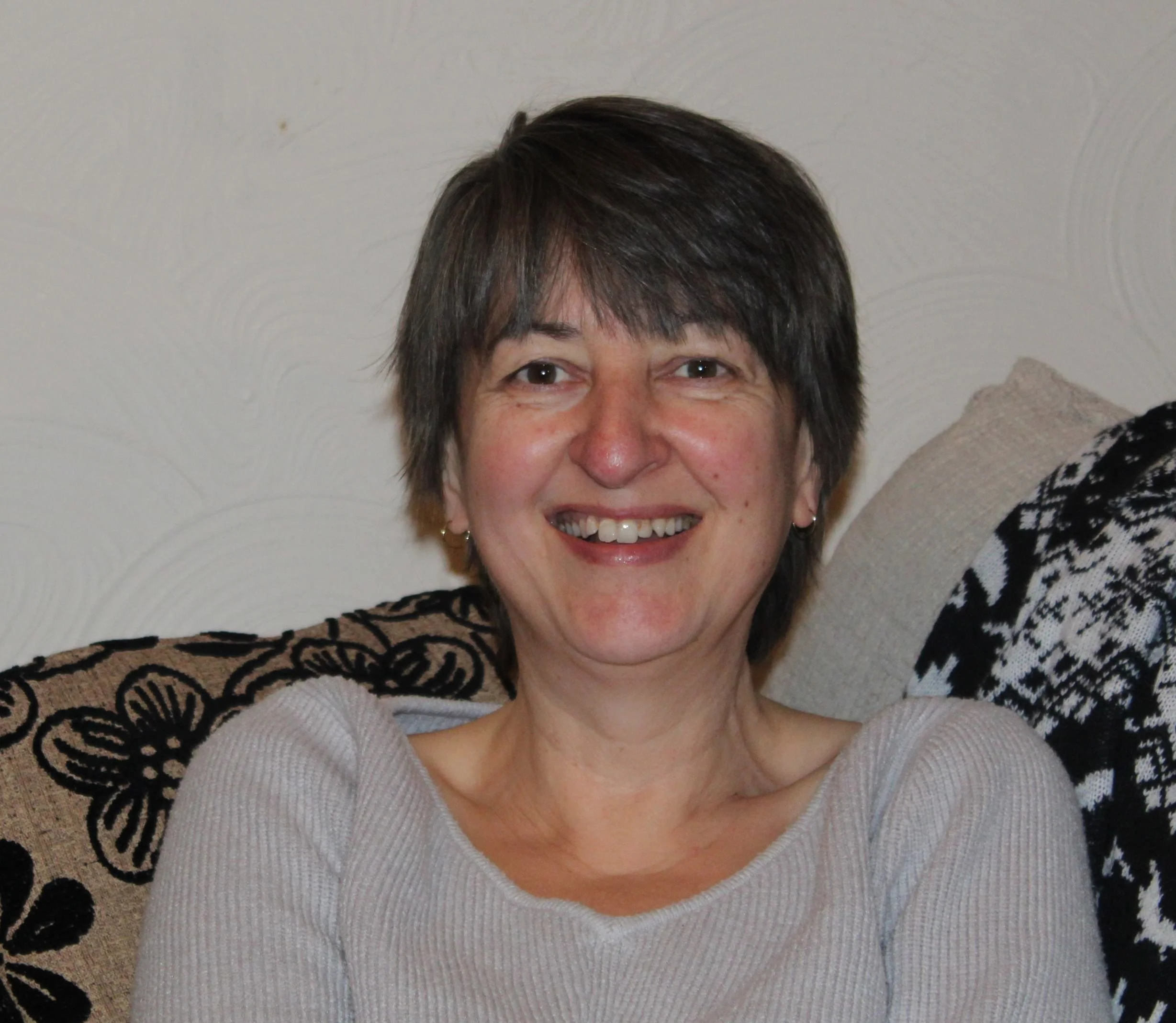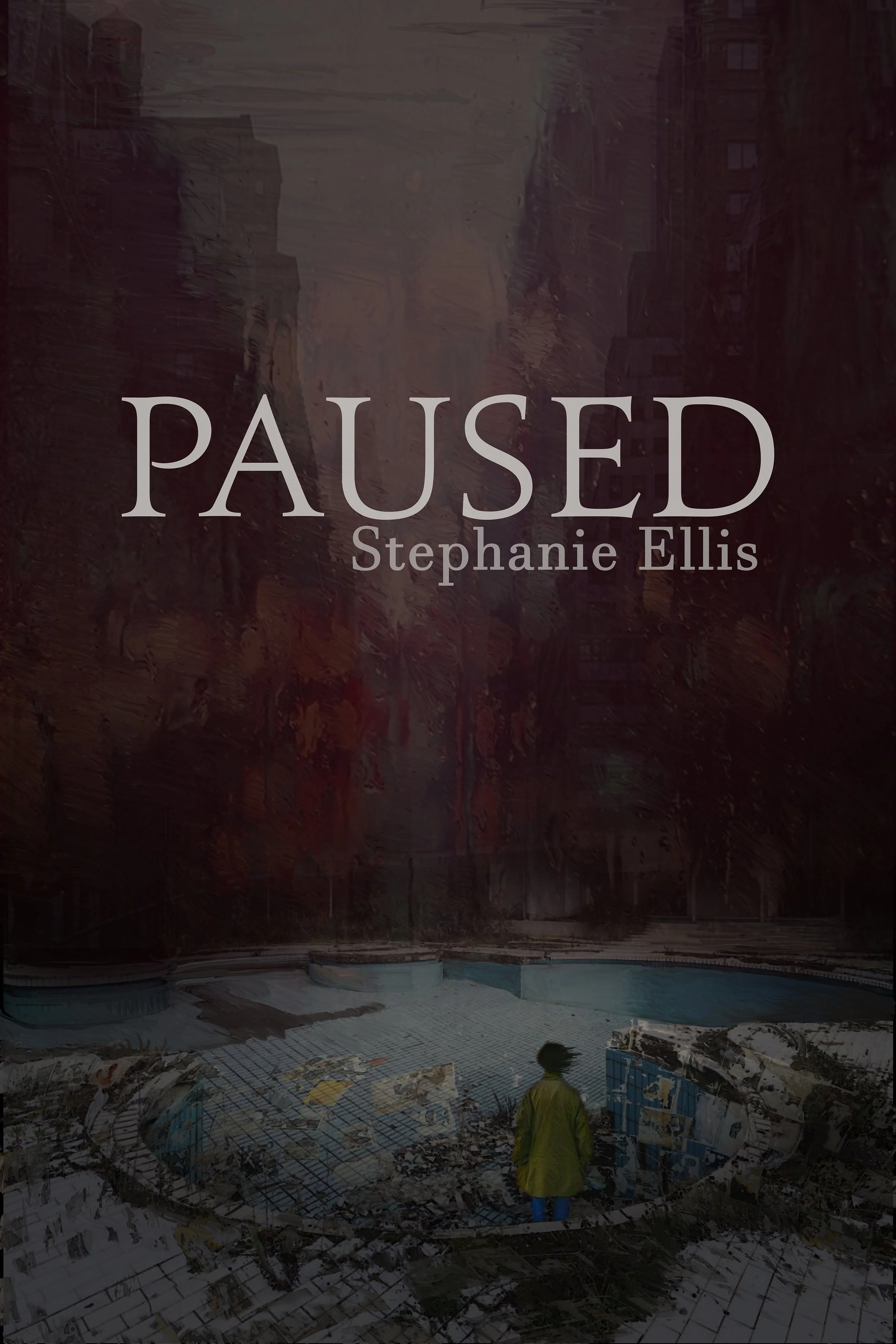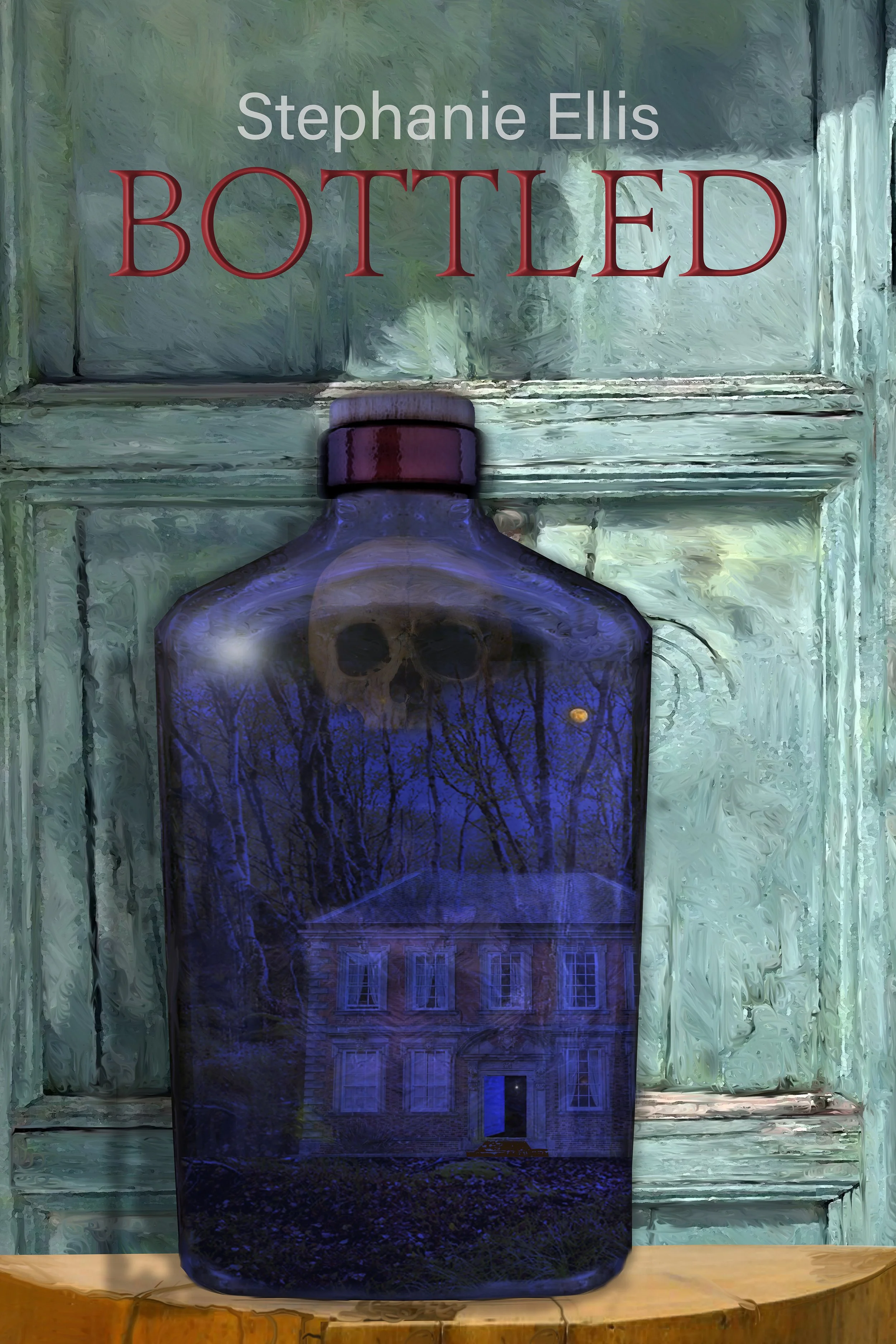Stephanie Ellis
Stephanie Ellis writes dark speculative prose and poetry and has been published in a variety of magazines and anthologies, the most recent being Scott J. Moses’ What One Wouldn’t Do, Demain Publishing’s A Silent Dystopia and Brigids Gate Press’ Were Tales. Her longer work includes the novel, The Five Turns of the Wheel and the novellas, Bottled and Paused. Her short stories can be found in the collections, The Reckoning, and As the Wheel Turns. Her poetry has been published in the HWA Poetry Showcase Volumes VI, VII and VII, Black Spot Books Under Her Skin and online at Visual Verse. She has also co-written a collection of found poetry, Foundlings, with Cindy O’Quinn based on the work Alessandro Manzetti and Linda D. Addison. A gathering of her dark twists on traditional nursery rhymes can be found in the collection, One, Two, I See You. She is co-editor of Trembling With Fear, HorrorTree.com's online magazine and also co- edited the Daughters of Darkness anthologies. She is an active member of the HWA.
Marina Raydun: You write very much on the dark side of the speculative fiction spectrum. What draws you to this genre?
Stephanie Ellis: I’ve read widely since very young childhood and always enjoyed work which had a dark ‘edge’ to them – those books which might treat with the darker side of human nature (the characters of Dickens are a classic example of this) and those other stories which ‘displace’ the reader and send a little shiver down the spine. I remember reading Alan Garner’s The Weirdstone of Brisingamen and it felt as if he was writing about the world I lived in. I grew up in a very rural area which involved long walks along deserted lanes to catch a bus to school, it meant I was often out walking at dusk which was full of shadows and that sense of shadow, of something other, has remained with me. It created a fascination, a sensation of otherworldliness which I wanted to explore and this in turn takes from folklore or my experience of human nature. It’s a tug that keeps pulling at me. So much of the darkness of humans is hidden by the night, by secrets, that it’s only natural these characters and their doings seep into my writing. I like to show them as sometimes likeable but also love to deliver a come-uppance when I can. It doesn’t have to be what everyone understands as horror, ie blood and gore, though there may be some of that; the dark explores how far people will go, it allows the reader to consider ‘what if’ and its consequences within a safe environment. And I, as a writer, have a huge amount of fun with this!
MR: Talk to me about Paused. Did the inspiration strike before, during, or after the pandemic we'd just lived through?
SE: Paused originated as a short story a couple of years before the pandemic. When critiqued, the concept was liked but generally it didn’t work as a short – it needed a bigger space and so I turned it into a novella. The concept was triggered by reading a couple of articles, one which discussed people with ‘Locked in’ syndrome and another which discussed technological advances to the extent a ‘cap’ had been created to read a person’s thoughts. Then I started to think what would it be like if sections of society started to suffer from being ‘locked in’, as if a paused button had been pressed on bodily response. I also wanted to challenge how people saw themselves. Do they always do the right thing, or do they take advantage? When you see how people are so willing to film something unfortunate and upload, rather than step in and help, I think we know the answer. Hypocrisy and selfishness can find its way into anyone at anytime – but we deny it.
MR: What is your favorite underappreciated novel within your genre?
SE: Oh my goodness, I love so many stories and they constantly change their position in my mental pecking order; most easily share the number one spot! This is such a hard question for a devoted reader. At present, I would say there’s a tie: The Grimoire of the Four Imposters by Coy Hall and Hummingbird by T.C. Parker. Both are excellent reads and have been well-received but they need a bigger audience and sometimes it’s hard to reach that.
MR: What do you owe real life people upon whom you base your characters?
SE: I don’t necessarily base characters on one person per se but I do build their personalities and behaviour on observations made over what is now becoming a long life. Being an older writer, I have experienced and seen a lot of the good and the bad in the world and in my immediate environment. This has shown what is possible, and I use that element to feed into my stories. Working with teens for a number of years until recently, fed into how the daughters of the main character (Dr Alex Griffiths) in Paused behave, their response to bullying and torment.
MR: What was the hardest scene to write?
SE: In Paused, it was the scenes where the person is struck down and how they see things happening to them and are unable to respond. There were two particular instances, one where the brother of Dr Griffiths is in charge of a demolition crane and the other, where Dr Griffiths daughter is left to the mercies of a predatory nurse.
MR: When writing this book, I had to work out how to make it terrifying and the only way to do that was to see the world from the viewpoint of a ‘locked in’ person and by keeping this to the family of Dr Griffiths it helped deliver a bigger impact.
SE: In The Five Turns of the Wheel, I included my real experience of an extremely traumatic miscarriage. Everything that character in the book experienced, the words spoken to her, the treatment in the hospital, everything is as it happened to me; and there were still some awful bits I left out because they couldn’t be worked into the storyline. This was a catharsis in a way as I didn’t realise until I wrote it how angry I still was about that treatment. At the time, I buried a lot of those feelings as I had a young family, but as the years went by I reflected more on it and needed to work through it in some way.
MR: Can you tell me a little bit about your creative process, specifically when it comes to writing poetry?
SE: For prose, it all starts with an image in my head, of a person in a place experiencing some sort of event. Then I have to know what’s going on and I simply sit ‘behind their eyes’. They might walk down a lane, talk to someone, anything but from that point, the story has begun. I have no outline, no idea of the ending – this comes suddenly usually 2/3 of the way through – I just literally make it up as I go along. This character or event does however set the subgenre – whether it be folk horror, gothic, or post-apocalyptic, etc. Quite often I will also have music playing. The right kind of music can create the mood of the bit I’m writing, help me get into the right mindset. I listen to a lot of Scandinavian metal or doom/death metal so the lyrics don’t disturb, as is the case with some German bands and the neo-pagan Heilung and Wardruna (the latter are great for folk horror as their music is often ritualised or treats of ancient sagas).
Poetry is even more organic. A lot of my poems have been written in response to an image, usually at the online literary zine Visual Verse and the image will trigger the idea of certain words or metaphors and I start to play with them. I love words and poetry allows me to experiment. Found poetry in particular is a wonderful form. I like puzzles and to tease a new original poem out of the words of another is a real challenge. Foundlings, written with Cindy O’Quinn, is based on the found poetry of dark poets Linda D. Addison and Alessandro Manzetti, who very graciously wrote the foreword. Cindy worked on Linda’s poems and I worked on Alessandro’s, then we both worked on the poems which Linda and Alessandro had written together, one of us writing a line or two, sending it off for the other to respond. It was, as Cindy has said, an utterly magical project. The response to this collection has been amazing with some of the best dark poets providing blurbs which have just blown us away. I’ve also written a novella in poetry, Lilith Rising, this time with Shane Douglas Keene. I took on the character of Lilith and he was Adam, so we could write our own bits and then react to what the other ‘character’ had done. Again this was just so easy to write. Only out recently, the response is again fantastic!
I tend to write in free verse but employ devices such as alliteration and slant rhyme to help give my work rhythm. I’m not generally one for form because of its restrictions. That being said, I have written a found sonnet, “Usurping Monster”, which will be included in Crystal Lake Publishing’s Shakespeare Unleashed. A new project, again working with Shane, also involves the inclusion of sonnets amongst the free form.
Nor is it always the visual which triggers my poetry. I am a big metal fan and purely for fun(!), I decided to take 200 of my favourite tracks and create 100 found poems from them. This was not that easy! A long song which might seem ‘mineable’ often turned out to have lots of very simple words and lots of repetition. I made sure to be extremely careful with this book, Metallurgy, which is self-published, as I didn’t want to get sued by anybody for plagiarism so I would continually check my new poem against the two source songs to make doubly sure it was unique. There is also a Spotify soundtrack, called Metallurgy, to accompany it. This was a labour of love but there were many moments when I wondered why on earth I had started it!
I’ve also been very privileged to be included in the HWA Poetry Showcase Volumes VI, VII, VIII and IX!
MR: What’s the best and worst book review you’ve ever received?
SE: I have had some wonderful reviews for all my books (Paused, Bottled, The Five Turns of the Wheel and Reborn) which have touched me deeply. One which remained with me was when Jonathan Maberry tweeted in response to Steve Vassallo of Brigids Gate Press (although the company did not exist at that time), that The Five Turns of the Wheel was ‘indeed a superb book’. Most writers seek validation and long for someone higher up the ladder to notice them and that was my ‘moment’, if you like. But I will throw in that writers such as Kev Harrison, TC Parker, Coy Hall and Laurel Hightower have continually written in support of my work. And having mentioned Steve, he and his wife Heather, when they started Brigids Gate Press, gave my books a home and have continued to support me in ways I find truly humbling. If you want to find a genuine small press, look no further than Brigids Gate. They are wonderful people discovering fantastic writers all the time.
As to the worse, I have had a few where people just don’t like the book and that’s fair enough as reading is subjective. The worst one was on Netgalley where someone had picked up The Five Turns of the Wheel because they had heard of me via Horror Tree (where I work regularly on a few things) and ‘wanted to see if I could write’. Let’s just say what they wrote was not a reflection of the book and more an attack on me as a writer. I did not respond, there is no point, and whilst it hurt, I was able to look at all the other reviews I’ve had for my books and remind myself that there are readers who enjoy my work. I have also been writing long enough now to recognise when something I have written is dire, in which case it dies a death on my computer, or is good enough to send out. That sense of where you are with your work does take time to emerge and does not completely take the sting out of rejection or bad reviews but it helps.
MR: What is your favorite genre to read?
SE: Another awful question for a reader. Naturally, I read a lot of dark fiction, and am picking up folk horror as much as I can plus a lot of what has been released in the indie world in recent years. I really enjoy crime of the Scandi noir variety and historical fiction, also modern literature with a dark edge, whether of human nature or events. I’m currently writing a dark historical mystery, Women of the Witch Eye, set in 1649 and whilst there is a murder mystery to be solved, it also brings in superstition and witchcraft beliefs of that time. I will say that I love ‘doorstopper’ books, huge books which are completely immersive (Chuck Wendig’s Wanderers, Stephen King’s The Stand, Alan Moore’s Jerusalem, Todd Keisling’s Devil’s Creek, CJ Sansom’s Shardlake series) and I wanted to write my own. Women of the Witch Eye is going to be that book! They say write what you want to read. I don’t think anyone need worry when they say they read outside of the genre they write in, to read widely is the number one advice for any writer plus if you stick to one genre, your view of it can become jaded and as a consequence, so can your writing. Stepping outside keeps everything fresh. The one genre I do not read, I’m afraid are romances, it’s just not me.
I also read poetry and am growing my collection in that respect as well. I have works from Linda D. Addison, Alessandro Manzetti, Stephanie M. Wytovich, Ilya Kaminsky and Matthew Francis amongst so many others joining that shelf at home. I think poetry will get its own bookcase in the not too distant future. And before I forget, the Prose and Poetic Eddas, the Norse and Icelandic Sagas, the Anglo-Saxon and Viking poetry, is a massive favourite. The lyricism and musicality of that work has captured my heart. For a person who loves words, the texture of their writing makes it almost edible.
MR: What are you currently reading?
SE: Like so many readers I have a TBR of both the physical and digital kind but I am also ringing the changes by using my library more. This didn’t stop my going into Waterstones recently though and buying a book because my eldest daughter had picked it up and said ‘Mum, you’ll like this.’ It was Hyde by Craig Russell, a gothic crime story featuring ancient Celtic rituals, yep, that’s me! I’ll be reading it after I finish the two below.
I’m currently reading The Wolf and the Watchman by Niklas Natt och Dag, an historical thriller set in 1793 Stockholm which would fit on any dark fiction shelf! I’m also reading The English Civil War: A People’s History by Diane Purkiss as part of my research for my current WIP.
MR: What book do you wish you had written?
SE: So so many. I suppose ultimately it would be my favourite ever book, Something Wicked this way Comes by Ray Bradbury. It’s dark, poetical and utterly awe-inspiring in use of language. I will never ever attain those heights but we can always secretly wish! A close second would be any of the Discworld novels by Terry Pratchett. His lightness of touch, his humour and satire are just spot on.
You can learn more about Stephanie at https://stephanieellis.org and on Twitter at @el_stevie.




